TikTok Ban Countries: What’s the Latest on the USA and the EU (And What to Expect)
With over a billion active monthly users, TikTok has been one of the most popular social media platforms for years now, and it’s been showing no signs of slowing down – despite its fair share of controversy. That controversy has led to TikTok bans in nearly twenty countries, including India, China, some Western European countries, and even a handful of US states, such as Montana. So, what’s behind this mass TikTok ban? And can you still access the app when you travel to one of the countries where it’s banned? Keep reading to find out.
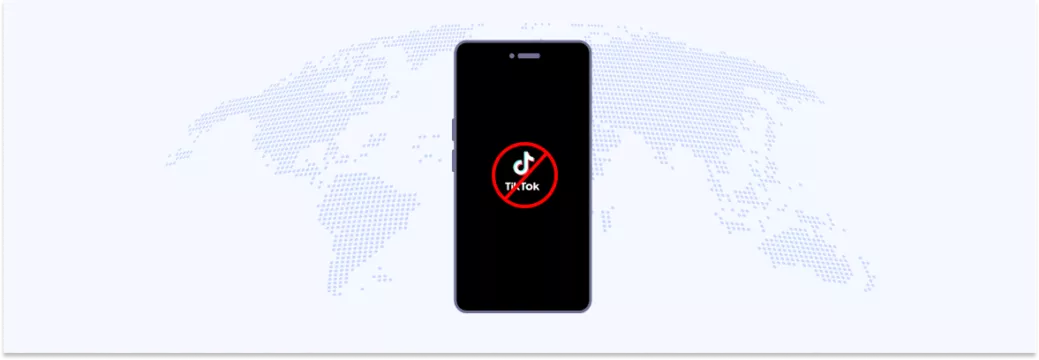
The Lowdown on the TikTok Ban
The Tik Tok ban has been trending in the news across the globe, and more nations are acting to limit or even ban the application, as there are some rather serious security issues with the app. And to tell the truth, it is one of the most restricted social media tools as there are 23 countries that have already banned Tik Tok to date. Then what is all the drama about? That is all boiled down to the fact that Tik Tok is owned by a Chinese company and that is creating a red flag of sorts. The Chinese government is also raising concerns that the government might be accessing the user data or even manipulating the content that individuals view. And this is not only in terms of the protection and privacy of data, but the issue of national security also plays a key role since the governments fear that there is a possibility of foreign intrusion or even abuse of personal data. With each country shutting TikTok, the discussion about the app and its safety and the need to have even stricter data protection laws is becoming increasingly active.
TikTok’s Future in the US and EU
At this point, the future of Tik Tok both in the US and across the EU is becoming quite doubtful. So, what’s going on?
In the US, politicians are back and forth with the intention to either prohibit or compel the sale of Tik Tok on the basis of national security and data privacy issues. Other people also fear that the prohibition of Tik Tok will restrict free speech and adversely affect adolescents and other users.
TikTok’s current situation in the US
The US government has been cracking down on TikTok, and it’s been a wild ride. Just the other day, the Supreme Court upheld a law that could lead to a national ban on the app – but the good news is that TikTok is back up and running after being shut down for 15 hours. However, things are still pretty uncertain, and the government has already banned government personnel from using TikTok on government-issued devices. Now, some lawmakers think that ByteDance might sell the US branch of the company to calm things down, while others are pushing for a complete ban if no agreement is reached.
What’s Happening with the EU TikTok Ban?
To this day, the EU has not completely prohibited Tik Tok, however, it has not provided it with impunity either. European Commission President Ursula von der Leyen has indicated that a ban of Tik Tok by all the EU member states cannot be ruled out and that the choice will be based on the security issues. And in the case that the EU has not banned Tik Tok as a country, an individual country can block it as they may believe it poses a threat to the security of their citizens.
Regulations keep evolving, and thus, be ready to follow. The next thing we should discuss is the reasons why Tik Tok is banned in certain states.
Main reasons behind TikTok access limitations
We are going to begin by discussing the countries that have prohibited Tik Tok or at least implemented some restrictions on this app before we begin to consider the list of those that have been banned. Many governments are citing the issue of privacy and security as the motive behind the restriction and outlawing of Tik Tok, and they are stating that it is all about data protection and cyber security. These are the primary causes that have been behind restricted access to Tik Tok by the users.
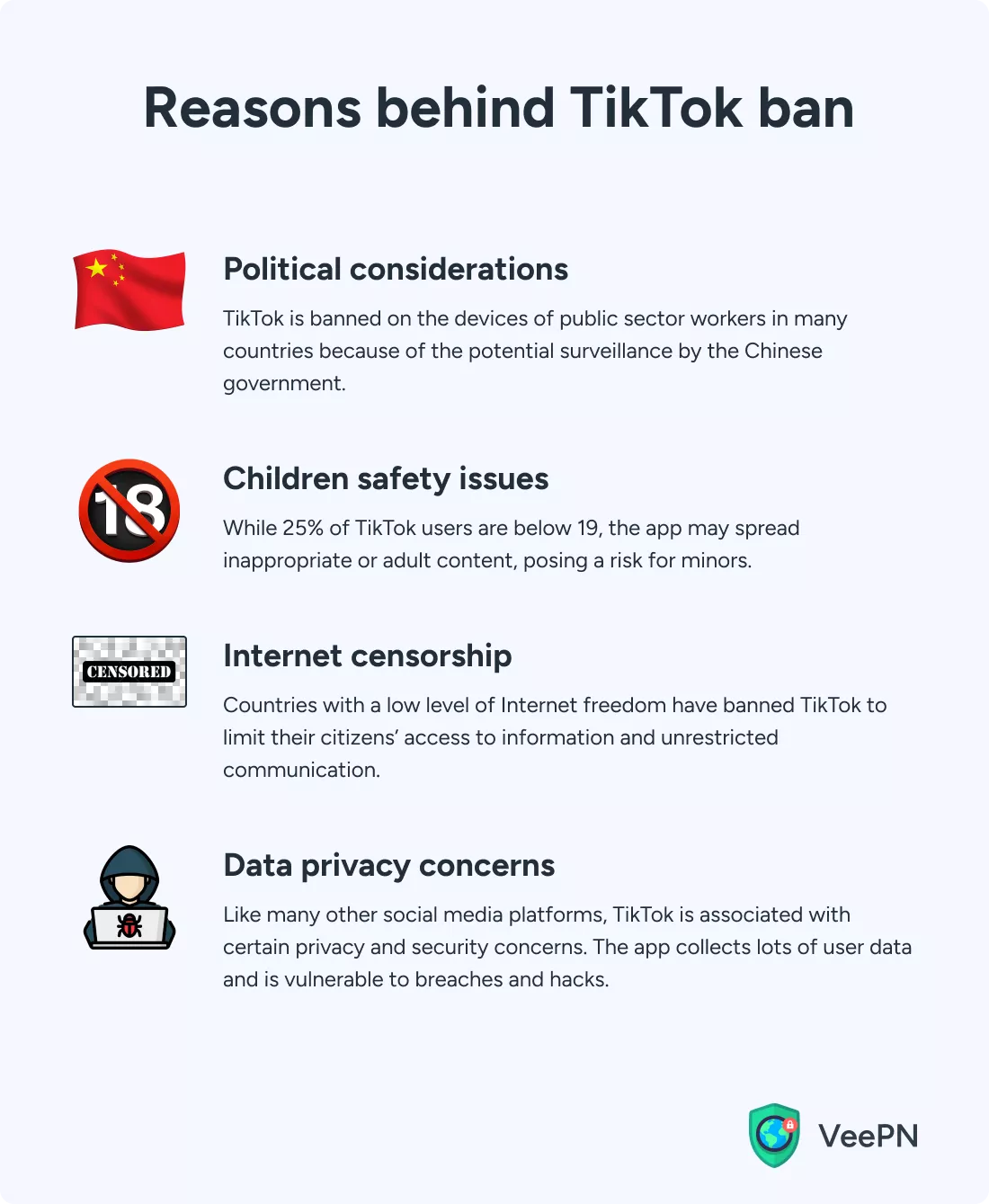
Reasons for the Ban
In the US, Canada, Australia and lots of European countries, governments started suspecting that TikTok might be a threat to their national security because of its connections to the Chinese government. Many of these bans are justified on national security grounds, with authorities citing concerns over data privacy, possible Chinese government influence, and espionage risks. And the thing is, TikTok is owned by a company called ByteDance – which is based in Beijing, China. And of course, the Chinese government has a pretty tight grip on local tech companies, including software. Some people – like the famous hacker group Anonymous – are even suggesting that TikTok is a spyware app.
Now, even though there’s no concrete evidence that TikTok is sending data to Chinese authorities, the tension between Western democracies and China is a huge part of why TikTok is banned in the US (more on that later).
Safety Concerns
While social media platforms like Twitter (now rebranded as X) & Facebook (also now doing business as Meta) tend to have the most traction with older generations, TikTok’s focus is squarely on the younger crowd. We’re seeing a pretty strong skew towards younger users, with 37.5% of TikTok’s user base under the age of 19. Here is the age and gender breakdown of TikTok users as of April 2023:
But here’s the thing – that’s not the only reason why TikTok’s been so darn successful, it’s also one of the biggest concerns that lots of people have with the app. Just like any other social media platform that’s really popular with kids and teens (Snapchat, Likee, Omegle – you name it), TikTok just doesn’t have the kind of security protocols in place that you might consider “sufficient”. That means there are all sorts of potential risks for minors – data theft, being exposed to stuff you don’t want to see… the usual. Some governments have responded to this by banning or heavily restricting TikTok, essentially to try and prevent what they see as moral and social degradation among kids. Take for example, 2023, when TikTok got fined a whopping $12.7 million for allegedly processing kids’ data without permission. And that’s just another reason why governments might want to stick their finger on the “ban” button.
Political considerations
The US, Canada, Australia, and many European countries started to suspect that TikTok may pose a threat to their national security due to its potential connections with the Chinese government. The thing is that TikTok partially belongs to ByteDance – the company operating in Beijing, China. And, since the Chinese authorities have a tight grip over local technologies, including different types of software, some (including a famous hacker group Anonymous) suggest that TikTok is a spyware app.
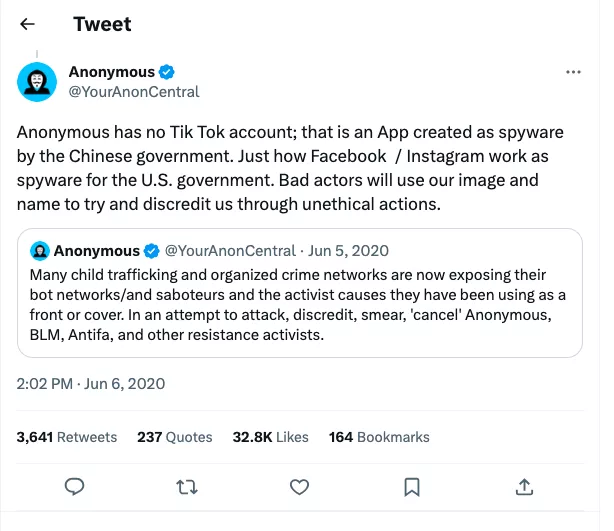
Although there’s no clear evidence that TikTok transmits data to Chinese authorities, the political tension between the Western democracies and China is one of the key reasons for the TikTok ban in the US (more on that a bit later).
Children safety issue
While social media platforms like Twitter (now X) and Facebook (now Meta) are mostly popular among older generations, TikTok focuses on younger audiences. In fact, 37.5% of TikTok users are under 19. Here is the distribution of TikTok users by their age and gender, as of April 2023:
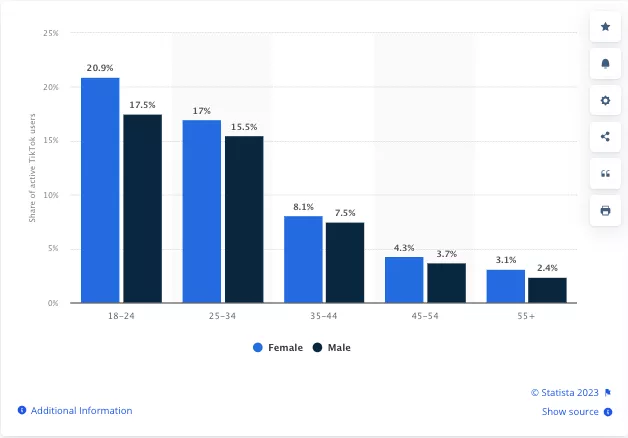
But that’s not only the main cause of TikTok’s success, but also one of the greatest concerns associated with the app. Just like any other social media application actively used by kids and teenagers (such as Snapchat, Likee, and Omegle), TikTok doesn’t provide sufficient security protocols and moderation. This causes potential risks to minors, including data theft and the exposure of inappropriate content. In particular, in 2023, TikTok was fined 12.7 million dollars for illegally processing children’s data. And that’s another motive for governments to ban TikTok.
Internet censorship
People often get a little riled up when their governments start talking about “censorship” of social media and messaging apps. But the thing is, in countries where the internet is pretty tightly controlled – where you’re more likely to be paying a price for speaking out, or getting “unbiased” news – these kinds of apps tend to be the first thing to get blocked. That’s because they’re seen as a threat to that kind of control. So you see loads of Facebook, Instagram, Twitter, Snapchat and YouTube being blocked in places like Afghanistan, Bangladesh, Indonesia, Pakistan & Russia. In a few of these countries TikTok’s also been put on the chopping block – because some of the stuff people are posting just isn’t considered “in line with Islamic law”. Funny thing is, TikTok doesn’t even work in China – but that’s not stopping the people who brought us Douyin, the Chinese version of TikTok.

Data Privacy and National Security Concerns
You know what’s probably the biggest reason why lots of countries have banned TikTok? Data and security concerns. People are getting worried about just how much information is being collected by these apps, and who it’s being shared with. I mean, TikTok’s not exactly swimming in a sea of transparency when it comes to its data handling practices. Check out these risks you should know about:
- A really vague privacy policy – basically, when the Europeans started banning TikTok, some people pointed out that their privacy policy is a bit… fuzzy. And some security experts have actually been able to identify a few of the ways that TikTok might be messing with your online privacy.
- Data collection off-app
- Bunch of weird permissions when you install the app – apart from having access to your browsing history, TikTok also gets to track your location, camera & microphone.
- Massive security breaches – there have been some pretty big ones, and people are concerned about how much sensitive information might’ve leaked out as a result.
- Loads of data being collected – I mean, everyone collects some data, but TikTok’s just got an awful lot of it, if you catch my drift.
Want to learn more about what’s going on with TikTok and data privacy? Check out our latest blog post on the subject.
Now, how much of your info is TikTok actually collecting? & is that really a good reason to ban the app?
Public Sector Ban on TikTok
In March 2023, a real turning point happened – several countries, including Australia, Belgium and Canada, implemented a public sector ban on TikTok. What this means is that government employees weren’t allowed to have TikTok on their work devices – or even use it on their personal devices for work-related activities. And in response to concerns about data security, the European Union, the French government & other government bodies were quick to follow suit, blocking TikTok on official devices.
Social Harmony and TikTok
Beyond security and data protection, several countries have banned TikTok in a bid to protect social harmony and uphold cultural values. Although in 2022 the Taliban government in Afghanistan did impose a ban on TikTok, the real reasons behind this move were a bit more nuanced. According to the government the app was spreading what it deemed to be immoral content and disrupting social cohesion. Nepal followed suit in 2023 – imposing a nationwide ban on TikTok – citing concerns that the platform was responsible for spreading indecent materials and undermining social harmony. These actions highlight how governments can view TikTok not just as a national security risk, but also as a threat to social order and traditional values. In India, the government actually banned TikTok and a bunch of other Chinese apps back in 2020, citing both national security concerns and the potential for these platforms to bring about social unrest. The bans in these countries really drive home the point that governments are taking TikTok very seriously and have a whole load of complex reasons for wanting to restrict the app. Ranging from protecting national interests to maintaining social stability, these reasons show just how complex the issue is.
What data does TikTok collect?
According to TikTok’s own privacy policy, the app collects customer data of three different types: user-provided data, automatically collected data, and third-party data. What does all this mean in practice? Well here’s a breakdown of all the stuff it actually includes:
- User-provided data: contact details, stuff you create and share on the app, info about purchases, e-commerce transactions, age and identity data, and messages about the goods you’re buying.
- Automatically collected data: information about how you interact with the app, biometric and location data, technical details like your IP address and device info, cookies, and shared media like images and audio files.
- Third-party data: info from accounts you share on other platforms like Facebook or Google, interactions with advertising materials, info about you that’s been shared on other accounts, data that’s open to the public, and info from sellers and merchants.
So all in all, TikTok isn’t exactly the best app for your privacy. On the other hand, it’s also not a lot worse than the apps provided by other tech giants like Google, Facebook and Twitter. All of them collect loads of customer information which raises some pretty big concerns about safety and privacy online. But the fact that strict measures are being taken against TikTok, while other social media and messaging apps are left alone, does seem a bit unfair.
💡 Pro tip: If you want to protect your digital identity and personal information while using TikTok and other social media apps, try VeePN. It’s a top-rated virtual private network (VPN) service that will take your Internet privacy to the next level. VeePN hides your IP address and encrypts your traffic, making it nearly impossible for third parties to snoop on you. Besides, you can benefit from some extra security features, like Kill Switch and NetGuard.
What countries have banned TikTok?
Now let’s take a closer look at the complete list of countries that have banned TikTok and see what the reasons for these limitations were. It turns out that some countries have put in place temporary bans on TikTok after incidents reflected ongoing concerns about data privacy and content regulation. Also, many of these bans only apply to government agencies or institutions – so the general public is still free to use the app.
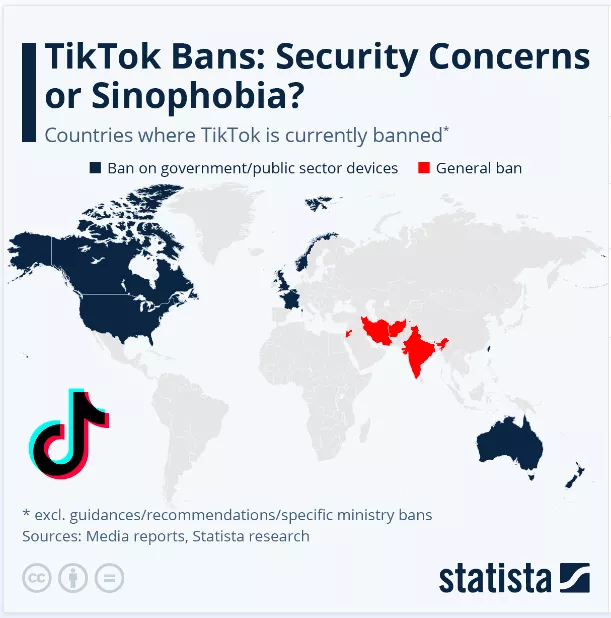
TikTok completely banned
Let’s start with the countries that have completely banned the TikTok app for all citizens.
Afghanistan. In April 2022 the Taliban did limit access to TikTok, along with a whole load of other apps and websites. They claimed the ban was aimed at “protecting younger generations from misleading content”.
Bangladesh. TikTok has been censored in Bangladesh, as have loads of online platforms, because of spreading “inappropriate videos”. The ban is part of a broader effort to restrict access to all sorts of sites and to limit internet access for kids to protect them from the moral and social degradation.
India. The Indian government limited access to TikTok and some Chinese applications back in 2019, considering it a national security threat. Tensions between Indian and Chinese troops had played a part in that decision. And funnily enough, at the time there were over 200 million TikTok users in India.
Indonesia. In 2018, TikTok was one of dozens of apps and online resources censored in Indonesia.
Pakistan. Pakistani authorities have limited access to TikTok four times since the first ban in October 2020.
Russia. The Russian government banned TikTok, along with Instagram, Facebook, Google News, and loads of other apps, due to the “spread of misinformation”.The following countries have put some kind of limits on access to TikTok, often in the form of a temporary ban, or by not allowing it on official public sector devices, government computers, public sector mobile phones, and business phones of civil servants. These sorts of restrictions tend to target government agencies, municipal workers, and other folks in the public sector rather than the average Joe or Jane, mainly because of security concerns and recommendations from the security agencies, and the country’s signals intelligence agency
🇦🇺 Australia TikTok is off the menu for government devices in Australia. The feds made the call to ban it in April 2023 after taking advice from security agencies, with the Attorney General Mark Dreyfus also chiming in, all on account of security worries.
🇧🇪 Belgium In March, Belgium decided to limit public sector folks from using TikTok on their official government devices, business phones, computers, and what have you, on account of security & misinformation risks. The ban was in place for 3 months.
🇨🇦 Canada Canadian authorities brought in a ban on government agencies using TikTok in February 2023 because it was deemed an “unacceptable risk to privacy and security”. This affected all sorts of municipal workers.
🇩🇰 Denmark Denmark’s Defense Ministry essentially said no to TikTok on official government devices & computers due to security worries. And then all Danish universities followed suit by banning the app in April 2023.
🇪🇺 European Union The EU’s Parliament, Commission, and Council have been told they can’t use TikTok on their devices since March 2023 on account of recommendations from the signals intelligence agency and the state security service. The rationale was that TikTok’s data policies were pretty sketchy compared to other major social media players.
🇫🇷 France A bunch of social media companies, incl TikTok, were banned for all French public sector workers in March. This affected their official government devices, business phones, computers & what not, because of security worries.
🇱🇻 Latvia The Latvian Foreign Ministry folks are not allowed to have TikTok on their devices due to security concerns, a resolution that was put in place in early 2023.
🇳🇱 The Netherlands The Dutch central government had a go at limiting TikTok use in 2023. Municipal workers were told to yank the app off their work devices, although this was more of a recommendation than a full on ban.
🇳🇿 New Zealand It turns out that TikTok won’t be allowed on New Zealand’s Parliament staff phones, according to an official document from March 2023. This was after some input from government agencies and security agencies.
🇳🇴 Norway Norway’s Parliament employees have had their access to TikTok limited because of worries about privacy & security. The country’s justice ministry had flagged this up as a potential security risk to the country.
🇹🇼 Taiwan All Taiwanese government officials are banned from using Chinese apps, including TikTok, on their devices on account of national security. Plus, the local authorities are keeping a close eye on it, trying to assess the potential risks.
🇬🇧 The UK The UK joined the ranks of other Western democracies by banning TikTok on public workers’ devices in March 2023. This came after recommendations from government & security agencies, & the state security service.
🇺🇸 The US The situation with the US is a bit more complicated. In December 2022, the use of tiktok was blocked on government agencies’ devices, affecting municipal workers. Then in March, American senators proposed the US RESTRICT Act which would enable the US authorities to ban technologies connected to foreign adversaries (ie China, Cuba, Iran, North Korea, Russia, and Venezuela). Despite the efforts of TikTok’s CEO Shou Zi and a lot of noise from users, it looks like the plan is still going ahead. Montana was the first state to officially ban TikTok for everyone in May 2023. You can check out our recent article about the ban for more info.
In January 2025, the Supreme Court upheld a law that could potentially lead to a wider ban on TikTok. Although TikTok is operating under a temporary arrangement, it’s definitely not out of the woods on the national level.
🇸🇨 Scotland The Scottish government implemented restrictions on staff devices because of security and privacy concerns – basically they don’t want any of their employees using TikTok on their work devices.All things considered, the controversy around TikTok seems overblown, given authorities are being a bit too hasty. Security experts seem to think the app isn’t significantly more of a threat to your privacy than other super popular social media platforms.
So, how do you avoid getting blocked from using TikTok – especially when you’re traveling to a country where it’s banned, or at least restricted in some way? Well, if you want to keep using TikTok, your best bet is a reliable Virtual Private Network (VPN) service.
TikTok partially banned
The following countries partially limited access to TikTok. Note that the ban mostly applies to government workers rather than common citizens.
🇦🇺 Australia. TikTok is currently unavailable on government devices in Australia. The decision was made in April 2023 due to security precautions.
🇧🇪 Belgium. In March this year, Belgium limited the use of TikTok on government phones because of security and misinformation risks. The ban had been active for three months.
🇨🇦 Canada. Canadian authorities banned the use of TikTok on government devices in February 2023 because of the “unacceptable level of risk to privacy and security it presents.”
🇩🇰 Denmark. The country’s Defense Ministry limited access to TikTok for government workers due to security risks in March 2023. The following month, all Danish universities also banned the use of this application.
🇪🇺 European Union. The workers of the European Parliament, European Commission, and European Union Council can’t use TikTok on their devices since March 2023.
🇫🇷 France. TikTok, along with several other social media applications, was banned for French public sector workers in March this year.
🇱🇻 Latvia. The employees of the Latvian Foreign Ministry aren’t allowed to have TikTok on their devices because of security concerns. The resolution was introduced in early 2023.
🇳🇱 The Netherlands. Like in many other European countries, the Netherlands limited the use of TikTok in 2023. But in this case, it’s rather a recommendation than a complete ban.
🇳🇿 New Zealand. The workers of New Zealand’s Parliament won’t be allowed to use TikTok on their phones as well, according to the official document released in March 2023.
🇳🇴 Norway. Privacy and security concerns were the main reason to limit access to TikTok for Norwegian Parliament employees in early 2023.
🇹🇼 Taiwan. All popular Chinese applications, including TikTok, are banned on the officials’ devices in Taiwan for national security reasons. Moreover, the local government keeps studying the potential risks associated with this app.
🇬🇧 The UK. Along with many other Western democracies, the United Kingdom banned the use of TikTok on public workers’ devices in March 2023.
🇺🇸 The US. Compared to other countries on this list, the situation with the US banning TikTok is a bit more complicated. In December 2022, the use of TikTok was prohibited on government devices. Then, in early March 2023, American senators introduced the US RESTRICT Act – a document that allows the US authorities to ban technologies connected to a “foreign adversary” (China, Cuba, Iran, North Korea, Russia, and Venezuela). And, despite the effort of TikTok’s CEO Shou Zi and the outraged reaction of many users, American senators are going to move on with the bill. In May 2023, Montana became the first state to officially ban TikTok for all users.
For more information, check out our recent article about the TikTok ban in the US.
In January 2025, the Supreme Court upheld a law that may lead to a wider ban on TikTok. Though TikTok has resumed operations under a temporary arrangement, the app is definitely put on even shakier ground on a national level.
All in all, despite the controversy around TikTok, the reaction of authorities seems somewhat exaggerated. After all, security experts don’t find the app more dangerous to users’ privacy than other popular social media platforms.
So, how to avoid the block and keep using TikTok – for instance, when traveling to a country where it’s partly or completely unavailable? Your best bet here is a reliable virtual private network (VPN) service.
Regulatory Environment and TikTok
The regulatory landscape for TikTok has been getting more and more restrictive, with governments the world over tightening rules and restrictions in response to security concerns. In the United States, the government has effectively banned TikTok on federal government-issued devices, citing worries about national security and the risk that hackers might get access to sensitive data. And in Canada, the federal government has also taken action, banning TikTok from government-issued devices – which they reckon poses ‘unacceptable’ risks to government employees’ privacy and security. Here in Europe, the European Parliament and the French government have both restricted TikTok on official devices – this is part of a broader focus on data protection and keeping government employees’ personal devices safe. As more and more government bodies implement bans on TikTok, we can expect the rules and restrictions to keep getting tougher, with more countries likely to follow suit and introduce new measures to address ongoing security and privacy concerns.
How to overcome TikTok limitations
A VPN is a powerful online privacy tool that protects your online traffic and enhances cybersecurity. Besides, it increases the level of Internet freedom, allowing you to access websites, apps, and services that are unavailable or censored in particular locations.
To be more specific, a VPN provides you with an anonymous IP address. This way, it alters your virtual location to the desired one while encrypting your Internet activities and hiding them from prying eyes. As a result, snoopers, hackers, Internet providers, and even government authorities (such as police) can’t learn what you’re up to online.
That said, if you need to access your TikTok account while traveling to a country where this app is banned, make sure to install a VPN app on your device. It will help you get around local limitations and overcome Internet censorship.
Note that VPNs are perfectly legal in most parts of the world, including the US, Canada, Australia, the UK, European Union countries, and more. But remember to check whether there are any restrictions in your particular country before doing anything potentially questionable. Please be informed that if some action is illegal without using a VPN, it will also be illegal with its use.
Now, let’s figure out how to use a VPN for TikTok to access and safely use the app wherever you are.
Impact of the TikTok Ban
The TikTok ban has had far-reaching and pretty significant effects on users, businesses, and governments all around the world. In the US, the ban has sparked heated debates about free speech, with lots of creators and businesses worried about the potential loss of income and the long term prospects for their online presence. And all this uncertainty has got people wondering about the impact on American jobs and the broader picture for the tech industry. In other countries the reaction’s been pretty mixed – some people are really upset about losing a popular social media platform, while others think the ban is a necessary step to protect national security. As more countries consider banning TikTok or imposing new restrictions, the social media landscape is shifting in a really uncertain direction, leaving users and businesses to figure out how to adapt.
Working Around TikTok’s Limitations
A VPN is a powerful tool that protects your online traffic and boosts your online security, giving you a lot more freedom on the internet. It also lets you access websites, apps and services that are blocked or censored in certain areas.
To get a bit more specific, a VPN uses an anonymous IP address to mask your location and encrypt all your online activity. This means that hackers, snoops, your internet service provider – even the authorities – can’t snoop on what you’re doing online. So, if you’re traveling to a country where TikTok’s banned, just install a VPN on your phone or tablet, and you’ll be able to get around any local restrictions and avoid having to deal with internet censorship.
Just a heads up: VPNs are totally legal in most countries, including the US, Canada, Australia, and the UK – but always double check to see if there are any restrictions in your particular country before you start doing anything that might get you into trouble. And remember, if something is against the law without using a VPN, it’s still against the law if you use one.
Now, let’s walk through the basics of using a VPN with TikTok, so you can get access to your account no matter where you are.
How to change TikTok location with a VPN
- Select a reliable VPN service provider. Not all VPNs are trustworthy – for instance, “free” services tend to collect customer data and sell it to third parties. So it’s important to choose a reputable VPN like VeePN. Our service sticks to a transparent No Logs policy and offers essential cybersecurity features.
- Create a VeePN account. Sing up for VeePN and select the most suitable pricing plan for your needs.
- Download and install the app. VeePN is a multi-platform solution compatible with multiple devices and operating systems. You can choose to download a VPN for Android, iOS, Windows, macOS, Linux, and more.
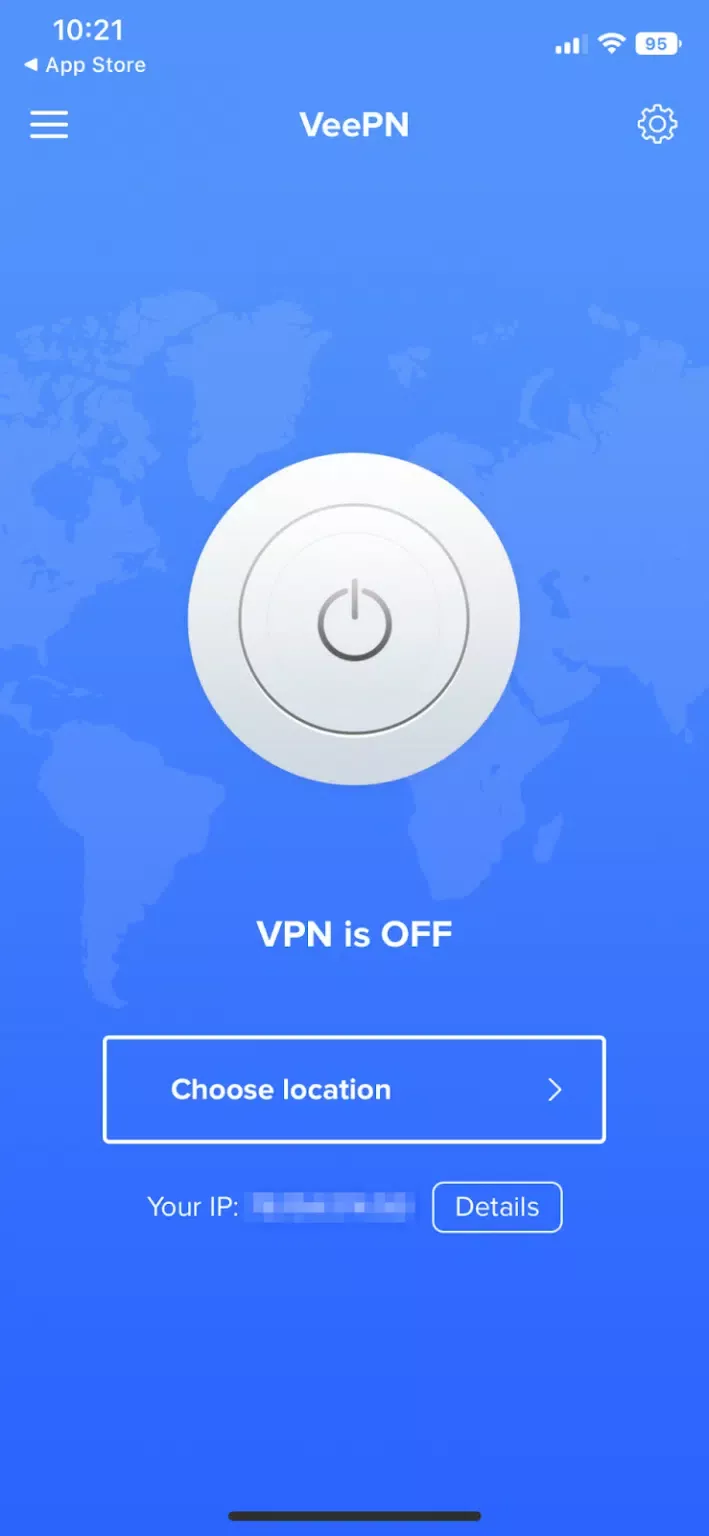
- Open the app and connect to a server. Select your new virtual location in a country where there are no limitations regarding TikTok usage. At this point, you get an alternative IP address instead of your actual one. VeePN provides access to servers in 89 locations across 60 countries worldwide, which means that you will get a safe and stable connection without compromising your privacy and Internet speed.
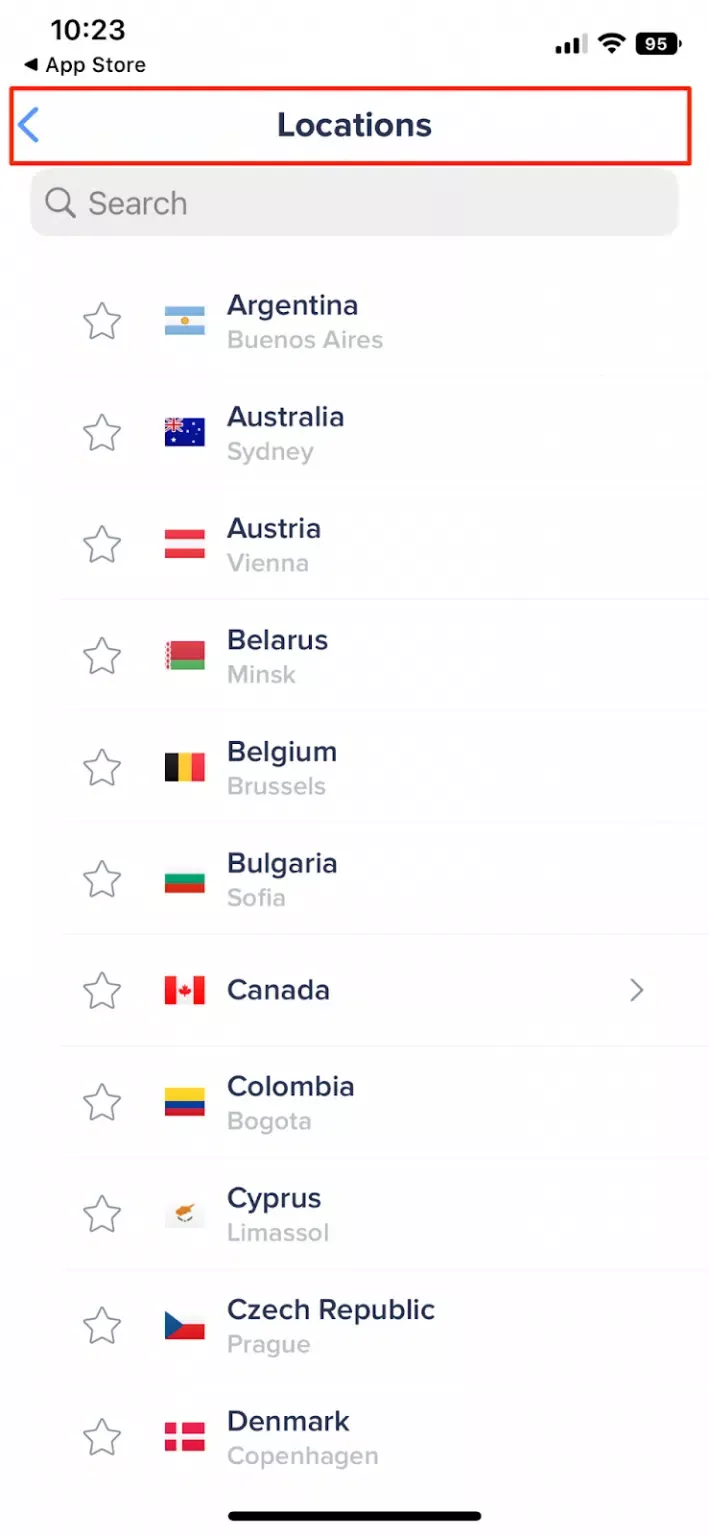
- Turn VeePN on. Tab the On button in the center of your screen and enjoy your favorite TikTok content while staying completely secure.
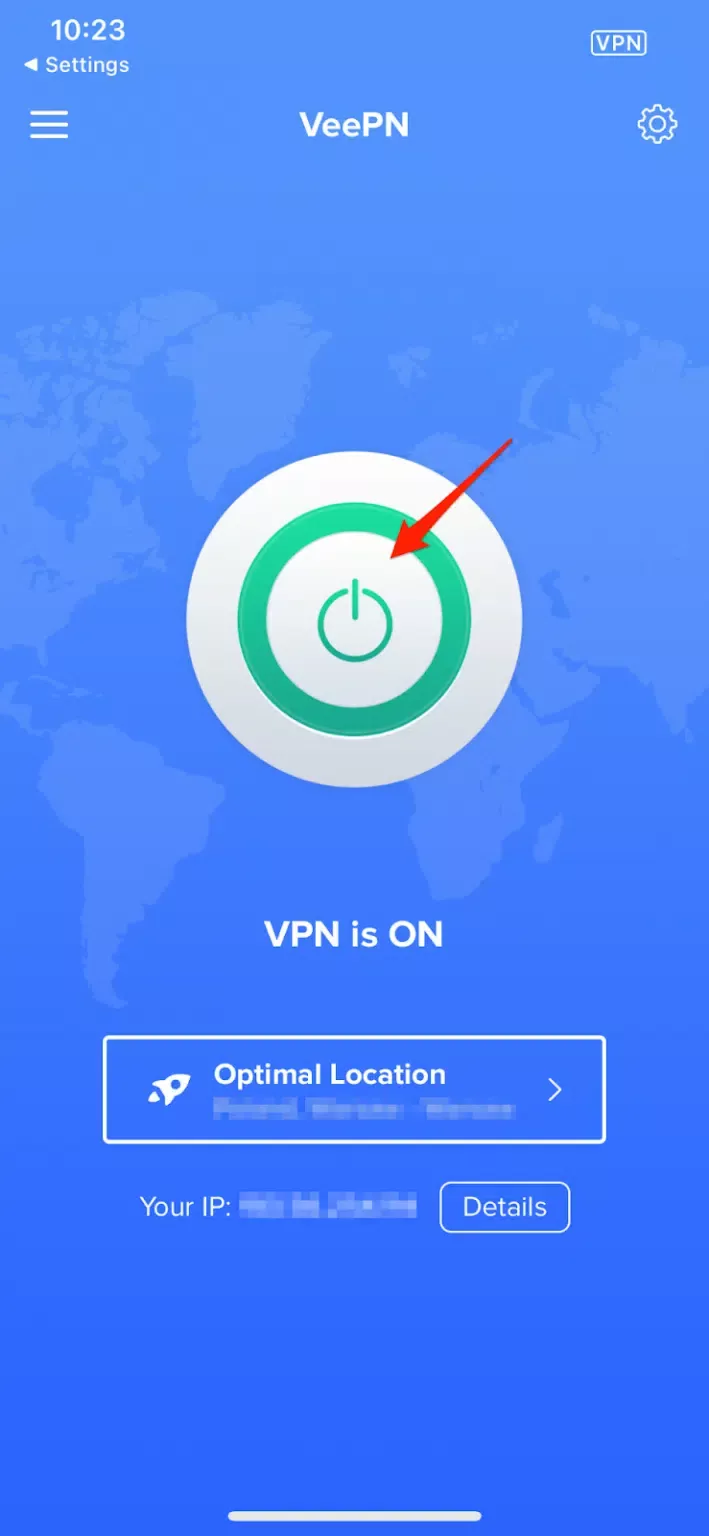
Try VeePN now with a 30-day money-back guarantee – access the desired apps, enhance your browsing freedom, and stay safe online at all times!
FAQ: TikTok Ban Countries
TikTok is completely banned in some countries due to online censorship, as well as security and privacy concerns – these include Afghanistan, Bangladesh, India, Indonesia, Pakistan, and Russia. The only state in the US that officially banned TikTok is Montana (at least, for now). Also, the use of TikTok on public sector workers’ devices is limited in other American states, Canada, Australia, and most European countries. For more details, read this article.
Some of the first countries to ban TikTok were Bangladesh (2018), Indonesia (temporary ban in 2018), and India (2019). As for the Western democracies, the US and the Netherlands suggested banning the app in late 2022, followed by many other countries in early 2023. Read this article to learn more.
The main reasons behind banning TikTok are the following:
- Potential connections between TikTok and the Chinese government
- Internet censorship
- Children safety issues
- Privacy and security concerns
Check out this article to learn more.
When traveling to a country where TikTok is partly or completely banned, consider using a reliable VPN like VeePN. It will mask your actual IP address and change your virtual location while encrypting your Internet traffic. This way, you can hide your real whereabouts and access the app. But note that VeePN is a VPN service not intended for conducting any illegal acts. if the use of TikTok is forbidden in your country, accessing it with a VPN will remain illegal.
TikTok is available in most parts of the world. The app works in over 160 countries. At the same time, many regions have partly or completely banned the application. For example, TikTok can’t be installed on government workers’ phones in the US, Canada, Australia, and many European countries. Read this article to learn more.
The use of TikTok was partly limited in the US due to the US RESTRICT Act issued in March 2023. Montana became the first US state that officially banned the app in May 2023. Later on, in January 2025, the Supreme Court upheld a law that could ban TikTok on a nationwide level. The situation is actively changing, so stay tuned for updates.
VeePN is freedom
Download VeePN Client for All Platforms
Enjoy a smooth VPN experience anywhere, anytime. No matter the device you have — phone or laptop, tablet or router — VeePN’s next-gen data protection and ultra-fast speeds will cover all of them.
Download for PC Download for Mac IOS and Android App
IOS and Android App
Want secure browsing while reading this?
See the difference for yourself - Try VeePN PRO for 3-days for $1, no risk, no pressure.
Start My $1 TrialThen VeePN PRO 1-year plan








